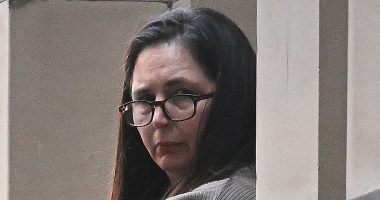In an Olympic drama that could match any athletic feat during the Paris Games, the saga around the ruling that stripped Jordan Chiles of her bronze medal while giving it to Romania’s Ana Barbosu took another odd turn on Wednesday.
An email error by the Court of Arbitration for Sport cost USA Gymnastics valuable time to prepare for the hearing challenging Chiles’ medal, a new report by the Washington Post detailed.
Days had gone by before USA Gymnastics was alerted to the Romanian effort and the hearing that was going to take place because the court sent emails to the wrong addresses and thus delaying any contact between the gymnastics body and the CAS.

The Court of Arbitration for Sport attempted to get in touch with USA Gymnastics on Aug. 6, but didn’t reach the Americans until Aug. 9, less than 24 hours before the Aug. 10 hearing was scheduled to take place, according to the report.
The United States successfully argued the deadline was unreasonable and the court extended the deadline by two hours.
A spokesperson for USA Gymnastics told the Washington Post the delay was “due to CAS sending case filings to incorrect email addresses.”
The U.S. Olympic and Paralympic Committee described the hearing as “rushed” and it “made it impossible” to raise the concerns and evidence to back their case that Chiles rightfully deserved the bronze medal.
“We were denied a meaningful opportunity to be heard,” a spokesperson for the U.S. Olympic and Paralympic Committee told WaPo in a statement.
The error could provide more grounds for the United States should they decide to take the issue up with the Swiss Federal Tribunal.
All of the drama stems from a complaint by the Romanian Gymnastics Federation that the United States had not asked the judges during the floor routine final to reconsider her score within the one-minute allotted to do so.

The CAS ruled that Chiles’ original score should be reinstated and that moved Barbosu back into third place giving her the bronze medal.
The drama has captivated sports fans across the globe days after the Olympic games came to an end.
The CAS also said it would not reopen the case despite the United States saying it had clear video evidence that proved the request to adjust the score came within the allotted time.
The United States has said it will continue its fight.
A report by the New York Times on Tuesday shed light on a possible conflict of interest by panel chair Hamid G. Gharavi after it came to light that he had done legal work for Romania.
The CAS put out a statement in response to the reports condemning what it called “outrageous statements published in certain US media.”
“As none of the parties involved in this case has challenged any Panel member during the procedure, it can reasonably be assumed that all parties were satisfied to have their case heard by this Panel. Any subsequent criticism is without foundation or merit,” the court said in a statement.







